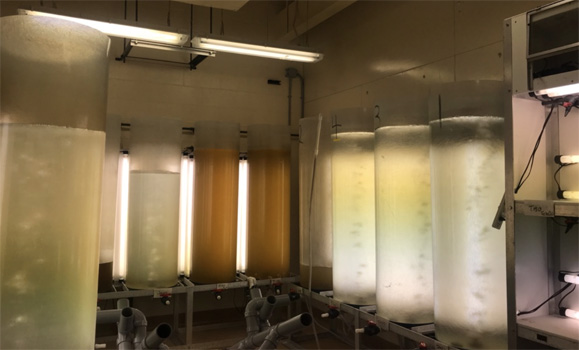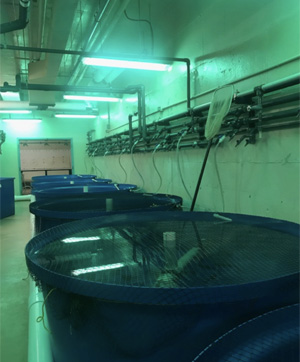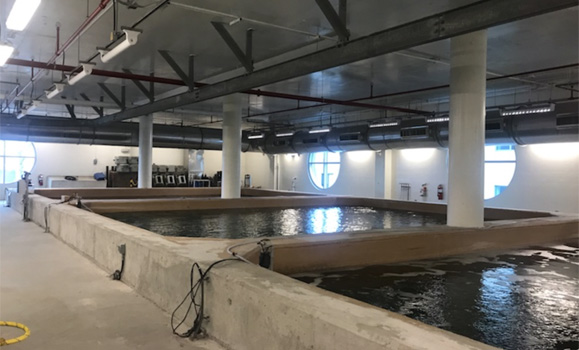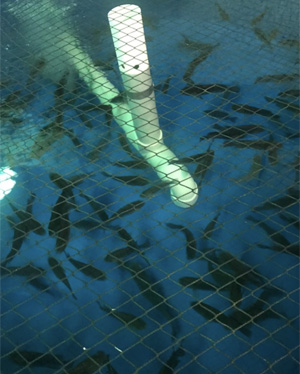Unsuspectingly nestled between the Steele Ocean Sciences Building and the Life Sciences Centre lies Canada’s largest aquatic research centre: the Aquatron.
It may sound like a Transformer, but the “tron” in the research centre’s name is short for “control.” A hub for world-class marine research, the state-of the art aquatic facility serves purposes ranging from studying animal behaviour to conducting marine engineering tests — and that’s just the tip of the scientific iceberg.

Photo: 250-litre fibreglass column tanks containing golden brown algae (Jillian Ivanov photo)
No more buckets
What started as marine researchers dragging buckets of seawater back and forth from the Northwest Arm in the 1960s for various experiments has morphed into an organized and well-equipped maze of wet and dry labs, complemented by a highly knowledgeable team available to help researchers meet their specific research goals.
The Aquatron’s lead aquarist, David Malloy, describes this world-class facility as “a hotel for marine research.” The facility provides researchers with the room and tools they need, catering to their research objectives, including a full-time staff of mechanical operators and biologists to help researchers take full advantage the Aquatron’s facilities. Researchers using the facilities can customize their laboratory’s water properties, such as seawater or freshwater, temperature, and salinity to mimic environmental conditions and variability.
From calibrating autonomous underwater vehicles — which listen for the calls of endangered right whales — for Dal-led networks like the (Ocean Tracking Network) and (Marine Environmental Observation, Prediction and Response Network), to aquaculture studies that have the potential to boost Nova Scotia’s economy, the Aquatron hosts Canadian and international aquatic research projects in roughly 25 facilities individual wet labs and large tanks.
While the extensive infrastructure and advanced technology provide a space for ongoing research projects, the professional operations team bring both dedication and expertise to the facility. Aquatron Manager John Batt and his full-time staff, including three mechanics and an aquarist, provide 24-hour support to ensure studies are successful with regard to animal welfare, timing and budget considerations.
“Research is not always straightforward; it can go well or not so well, but our goal is to always be successful,” explains Batt.
From ±«Óătv students to international researchers
The Aquatron houses a range of species, from freshwater fish to squid, seals and sea turtles. “It’s a shorter list of what we haven’t done than what we have done,” says Batt.
 Photo: Bank of 800-litre holding tanks containing tilapia for breeding program (Photo by: Jillian Ivanov)
Photo: Bank of 800-litre holding tanks containing tilapia for breeding program (Photo by: Jillian Ivanov)
In the last 10 to 15 years, the Aquatron has enabled more work with private industry and researchers from other areas beyond academia, such as government organizations and private consultants. These partnerships, supported by ±«Óătv Industry Liaison and Innovation, enable collaborative industry-academic projects, providing new sources of funding for job opportunities and research for students.
“Due to the large number of facilities available in the Aquatron, we wanted to be a resource for the entire region,” says Batt.
Nova Eel Inc. is one example of many regional collaborative projects facilitated by the Aquatron. The company is developing technology for eel farming in eastern Canada, an industry with the capacity to generate economic growth for the region.
Because American eels cannot be reared in hatcheries, the eel industry relies on wild caught eels to meet global demands for the delicacy. Wild glass (juvenile) eels are caught during spring in Nova Scotia and shipped live to Asia to be grown out in tanks for barbecued eel (unagi) in the Japanese food market — the largest market in the world for eel. The glass eel export industry currently generates about $20 million a year. With a switch to local eel aquaculture, and a shift away from the glass eel export market, the industry could yield around $200 million for the Canadian economy.
NovaEel Inc., an aquaculture startup is conducting developmental work at the Aquatron, including the use of a new animal pharmaceutica to test all-female production of eels, optimization of feed uptake and related waste management technology of farmed eel. The hope is that these proprietary techniques, developed working with faculty across ±«Óătv and industry worldwide, can provide significant benefit to the regional economy.
Related reading: ±«Óătv researchers help N.S. company launch eel Aquaculture
One-of-a-kind tidal energy research
Not only has the Aquatron facilitated animal housing for biological work, it is also used for testing engineering equipment. Recently, ±«Óătv University partnered with the (OERA) and the to collaborate on a research program for testing tidal energy-related technologies. On January 16 this year OERA launched a research call for $150,000 towards tidal energy-related projects that will rely on the Aquatron facility.

Photo: 300 m2 OEC pool tanks 1-3 allow researchers to conduct replication experiments on a real-world scale (Photo by: Jillian Ivanov)
“This OERA research program will be attracting new technology and new companies to both the region and to the Aquatron," explains Batt. "Wherever we can build new partnerships sits well for our research, students and the facility. It gives us the opportunity to build more research."
Related reading: Dal's cutting-edge aquatic research facility to test tidal energy
The research program will focus on improving environmental monitoring and engineering new turbine designs to handle the extreme conditions in the Bay of Fundy. Understanding how organisms interact with the turbines is especially important in Nova Scotia, as the commercial fishing industry is one of the province’s strongest economic resources.
The partnership with OERA will strengthen the naval architects and marine engineering programs already present in Nova Scotia, attracting new experts to the province. For the first time in Atlantic Canada, researchers are able to test their turbines on a small scale in the Aquatron before testing them at the Fundy Ocean Research Center for Energy (FORCE) in the Bay of Fundy.
Student perks
±«Óătv students also benefit from having the facilities available to them just feet from the classroom.
 Photo: Close-up of holding tank containing tilapia from breeding event last summer (Jillian Ivanov photo)
Photo: Close-up of holding tank containing tilapia from breeding event last summer (Jillian Ivanov photo)
Students can use the facilities for experiential learning and honours research, offering an experience unique to ±«Óătv. It hosts Engineering students testing marine designs, such as boat hulls. It also supports hands-on courses, such as , and , offered through ±«Óătv’s Faculty of Science.
The use of the facility extends to programs offered through ±«Óătv’s Faculty of Agriculture in Truro. Since ±«Óătv and the Nova Scotia Agriculture College merged five years ago, forming the Faculty of Agriculture, graduate students from the new faculty’s Aquaculture program have been conducting work in the Aquatron.
“With this new program, there will be more work with aquaculture in the future at the Aquatron,” explains Batt. ”We’re witnessing real science take place here with some pretty exciting research."

